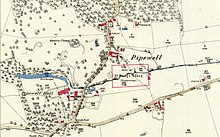Pipewell Abbey was an English Cistercian abbey, in the Northamptonshire hamlet of Pipewell in the old Rockingham Forest. It was established in 1143 by William Butevilain as a daughter house of Newminster Abbey in Northumberland.[1]

The Abbey also held properties in the neighbouring county of Warwickshire, in the area of Rugby, which was then a small village, the monks had several granges at the villages of Cawston, Thurlaston, Little Lawford and Long Lawford and Rugby, with other properties at Bilton, Newbold-on-Avon, Toft, and possibly Church Lawford. The Cawston Grange was the largest and most valuable of their Warwickshire properties, and became the base of their operations there.[2]
During the dissolution of the monasteries in 1538 the Abbey and its properties were seized by the Crown and sold off; the Abbey at Pipewell was sold to Sir William Parr, and in 1675, Pipewell Hall was built nearby from the stones of the Abbey.[1] The Boughton family purchased many of the Warwickshire properties, including Cawston, Bilton, Little and Long Lawford, and Newbold.[2]
References
edit- ^ a b "House of Cistercian monks: The abbey of Pipewell". British History Online. Victoria County History. 1906. Retrieved 13 January 2023.
- ^ a b Rugby: Aspects of The Past, Volume 11. Rugby Local History Research Group. 2020. pp. 32–35.
52°27′42″N 0°45′52″W / 52.461747°N 0.764312°W